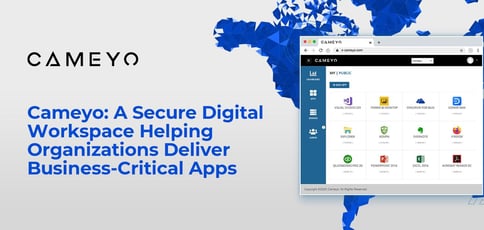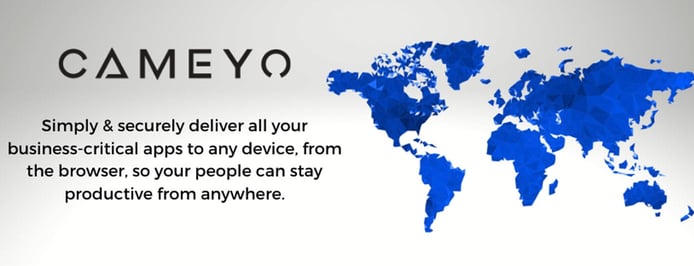
TL; DR: Cameyo is a digital transformation powerhouse, allowing businesses to deliver mission-critical applications via a simple web browser on any device and without VPNs. The company’s cloud-hosted digital workspace successfully balances a user-friendly experience with a strong, zero-trust security posture. With a new global partner program, Cameyo is helping partners meet the increased demand for productivity solutions in the remote workplace.
The term zero-trust security may sound like it was born out of paranoia, but there is nothing over-suspicious about this security concept. Developed in 2010 by cybersecurity expert John Kindervag, the verification-based methodology is centered on the notion that organizations should not automatically trust anything inside or outside of their network perimeters.
According to Robb Henshaw, CMO and Co-Founder at Cameyo, this year’s spike in remote workforces has spurred increased adoption of zero-trust security measures.
“Even if employees have company-owned laptops managed by the IT department, once you send them home to work remotely, they’re going to want to use their MacBooks, not a clunky old PC,” he said. “Since there’s no way of knowing what device they will use, IT teams have had to move to a zero-trust model that won’t grant unfettered access to the corporate network and data.”

Robb Henshaw, Co-Founder and CMO, gave us the scoop on Cameyo’s remote app enablement.
Cameyo’s cloud-hosted digital workspace does just that — allowing employees to access business-critical apps on the device of their choice without sacrificing security.
“We’re giving companies the ability to provide their people with the freedom to work the way that they want to work, in the way that is most productive for them, without compromising their security posture,” Robb said. “A lot of the time, these things are at odds, but Cameyo makes it easy.”
The solution provides employees with access to their applications via a simple browser session that’s entirely separate from the corporate network. No virtual private network (VPN) is required, and employees can use nearly any device.
“And it doesn’t matter if that device is riddled with malware,” Robb said. “Because it’s not connecting to your network and has no impact on your corporate protection,” Robb said.
Helping Customers Access Legacy Apps in the Cloud
Cameyo was founded in 2018 by endpoint security expert Eyal Dotan (Cameyo’s CTO), Andrew Miller (CEO), and Robb. Eyal’s 20 years of experience includes establishing the malware protection solution ViGuard, which was later acquired by LANDESK and eventually became what is now known as the Ivanti Endpoint Security solution. He also holds 12 computer security patents.
Around the time of the company’s founding, many organizations were attempting to migrate their businesses to the cloud.
“One of the biggest things holding them back was the anchor of all of their legacy applications — Windows, ERP systems, CRM systems, EHR software for certain industries — just big, heavy legacy Windows apps that don’t run in the cloud, on a Mac, or on Chromebooks,” Robb said.

Cameyo helps remote workers receive access to the apps they need to get their jobs done.
Such applications were not compatible with the cloud-based business model. So Cameyo built a virtual application delivery platform and digital workspace that made it simple for employers to grant all of their people access to their desktop apps — without installing and managing applications on every device.
“At the core of our system is this deep zero-trust security model built upon Eyal’s strong industry background,” Robb said. “With that level of competence, we have been able to provide a simple, user-friendly experience while improving a company’s security posture.”
Today, Cameyo empowers hundreds of organizations to deliver Windows and other internal web apps to users across the globe, making remote work not only a possibility but an efficient and secure one.
Promoting High-Security Performance and Optimizing UX
Cameyo, a virtual application solution, shouldn’t be confused with the virtual desktop infrastructure solutions, such as Citrix. Robb told us that there are different approaches to providing a digital workspace — and it’s not an either-or proposition.
“In a big organization, typically you’ll have a small percentage of power users who truly need a full virtual desktop,” he said. “Usually, about 90% of your people in any given organization don’t need that. What they need is anytime, anywhere access to the applications they need to do their job. Anything else would be overkill.”
Cameyo enables businesses to right-size their virtualization approach on a per-user basis, effectively reducing costs and complexity while enhancing security.
“The cost and implementation time is significantly less than rolling out traditional virtual desktop infrastructure,” Robb said. “Everything is fully cloud-hosted with Cameyo, so from an IT perspective, it makes your life easier. Our goal is to make our people more productive by providing tools that help them perform.”
When business models began to change dramatically in March, many IT leaders turned to VPNs to facilitate remote-work, Rob said.
“At the beginning, they were just throwing money at the problem, like, ‘This is going to be a short-term thing, let’s just give everybody VPNs and call it a day.’ But VPNs were not built for connecting hundreds of thousands of people to a corporate network.”
VPNs also didn’t make sense from a security perspective. Robb told us that they essentially provide a secure connection between a device and the corporate network. If the device is infected with malware, a VPN only creates an isolated bridge between the infected device and the network.
Cameyo’s VPN-less architecture, on the other hand, delivers the no-trust security model via secure delivery of software from the browser.
Get Up and Running with Cameyo Within Hours
Since the pandemic started, Cameyo has grown its customer base from a pool of approximately 75 businesses to an impressive 300. Robb credits Cameyo’s simple installation and deployment process.
“Rather than spending months deploying virtual desktop infrastructure, you can be up and running with Cameyo within hours for the initial installation and deployment,” he said. “Then, it only takes a day or so before all of the applications are loaded and ready to roll out.”
When coronavirus lockdowns were first implemented in the UK, the Cameyo team received an urgent call from a large energy company looking to provide employees remote access to their ERP system. That call took place on a Friday afternoon. By Sunday afternoon, Cameyo was able to grant remote access to the system to all 5,000-plus employees via a secure browser.
Regardless of industry or budget, Cameyo gives professionals the ability to enable remote productivity within a matter of days, not weeks. In another scenario, Cameyo helped 34 school districts deploy hosted learning solutions in just 30 days.
“We had been using VMware, but the cost was prohibitive, especially for widespread remote learning,” said John Cerio, Network Administrator at New York’s Baldwinsville Central School District, in a case study. “We needed a cost-effective alternative that would enable us to provide all of our students with access to all of the apps they need — including legacy Windows apps — from their Chromebooks. Cameyo not only saved us a ton of money compared to VMware, but it is incredibly easy to manage and is more secure.”
Introducing the Cameyo Global Partner Program
In September, Cameyo announced the launch of the Cameyo Global Partner Program. The initiative will provide partners with access to additional resources and benefits. Current partners include Achab, Amplified IT, Apisec, ASG Africa, Datacom, D&H Distributing, Helio Summit, Neverware, Onix, Online Partner, Softwatch, and Synnex.
“One of the things that we’re seeing is that across the board, not just from a customer perspective, but from these channel partners, is that everybody has been looking for a better way to manage technology than virtual desktops or Desktops-as-a-Service (DaaS),” Robb said.
The sellers and distributors who have signed up for the partner program thus far have had positive feedback.
“The reaction from their customer base to having a new option, having a different way to approach this problem has been great,” Robb said. “They can keep their businesses running cost-effectively at a time when cutting costs is more important than ever.”
HostingAdvice.com is a free online resource that offers valuable content and comparison services to users. To keep this resource 100% free, we receive compensation from many of the offers listed on the site. Along with key review factors, this compensation may impact how and where products appear across the site (including, for example, the order in which they appear). HostingAdvice.com does not include the entire universe of available offers. Editorial opinions expressed on the site are strictly our own and are not provided, endorsed, or approved by advertisers.
Our site is committed to publishing independent, accurate content guided by strict editorial guidelines. Before articles and reviews are published on our site, they undergo a thorough review process performed by a team of independent editors and subject-matter experts to ensure the content’s accuracy, timeliness, and impartiality. Our editorial team is separate and independent of our site’s advertisers, and the opinions they express on our site are their own. To read more about our team members and their editorial backgrounds, please visit our site’s About page.

